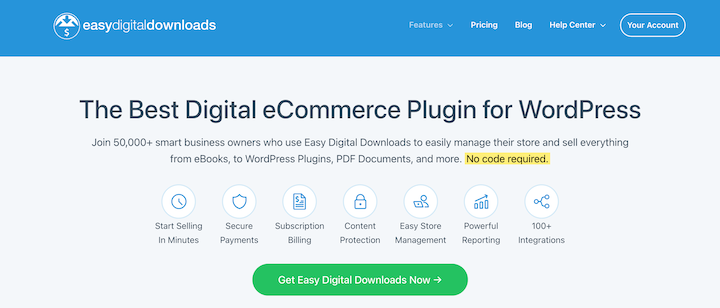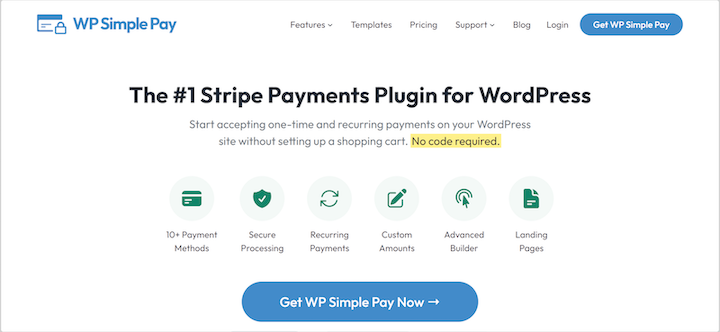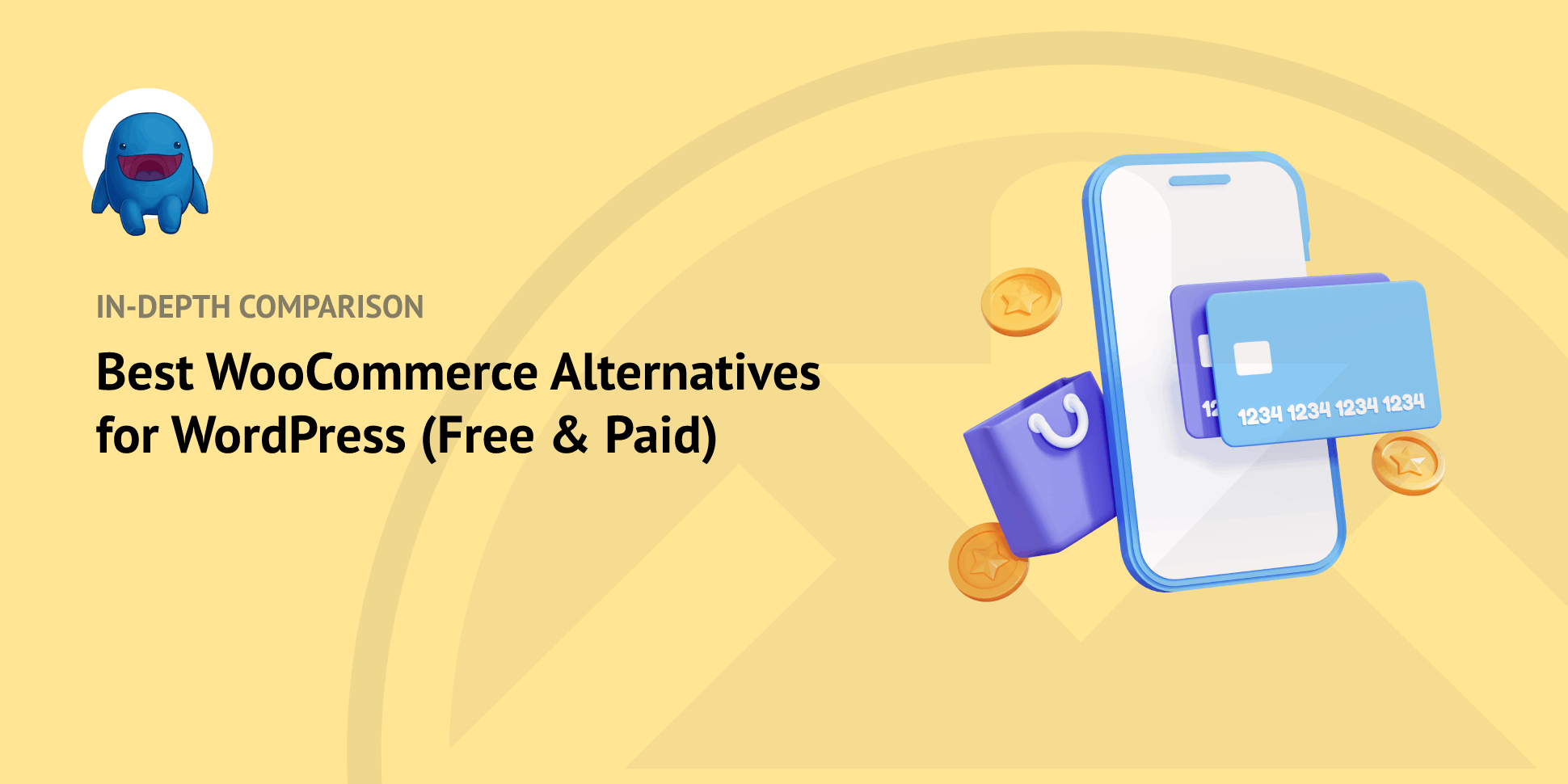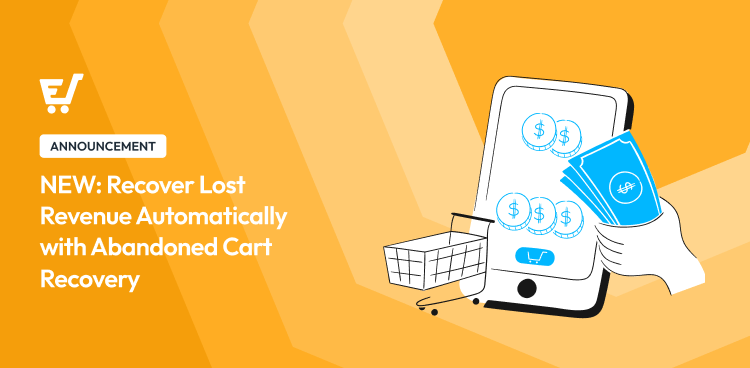Here’s something many WordPress store owners don’t realize: the best WooCommerce alternatives for WordPress might actually be a better fit for your specific business needs than WooCommerce itself.
Don’t get me wrong — WooCommerce is by far the most popular eCommerce plugin, and with good reason. But its one-size-fits-all approach that appeals to so many can actually work against businesses with specialized requirements.
That’s where these alternatives really shine. Perhaps you need better digital product delivery, more advanced membership features, or simpler checkout processes.
Whatever the case, I’ve put together a list of the best WooCommerce alternatives for WordPress users to consider.
WooCommerce Alternatives at a Glance 👀
Here is a quick look at five of the best WooCommerce alternatives for WordPress compared in key areas.
| Alternative | Free Plan | Starting Price | Key Feature | Best For |
|---|---|---|---|---|
| Easy Digital Downloads | ✅ | $99.50/yr | Lightweight and perfectly tailored for digital goods | Selling digital products |
| WP Simple Pay | ✅ | $49.50/yr | Easy Stripe payments, no cart needed | Simple payment forms |
| MemberPress | ❌ | $179.50/yr | Powerful membership management | Membership/content sites |
| BigCommerce | ❌ | $348/yr | Scalable SaaS eCommerce, multi-channel | Growing retail/ecommerce stores |
| SureCart | ✅ | $179/yr | Modern cart, subscriptions | Fast performance |
Key Takeaways
- Easy Digital Downloads has a free core plugin focused on digital sales and many premium extensions for scaling stores.
- BigCommerce offers robust SaaS commerce for larger stores with powerful integrations and strong multi-channel selling.
- MemberPress is mainly for memberships, subscriptions, gated content, and online courses, with no free version.
- WP Simple Pay delivers quick, code-free Stripe payments for donations, subscriptions, and services without a storefront.
- SureCart innovates with a free plan offering advanced e-commerce features (subscriptions, payment flexibility, collections).
Why Consider WooCommerce Alternatives?
WooCommerce alternatives exist because different businesses have different needs that generic eCommerce solutions can’t always address efficiently. While WooCommerce works for many stores, specialized tools often perform better for specific business models.
These alternatives are particularly valuable for WordPress users ecosystem while getting targeted features. They’re designed to work seamlessly with WordPress without the bloat of unnecessary features.
- Save time with tools built for your specific business model.
- Avoid technical complexity that comes with one-size-fits-all solutions.
- Improve site performance with lightweight, focused plugins.
- Get better user experiences tailored to your customer journey.
- Reduce costs by paying only for features you actually use.
These specialized tools can make the difference between struggling with a complex setup and having a store that works exactly how you need it to.
5 Best WooCommerce Alternatives
Ready to learn more about the top WordPress plugins to use for eCommerce? Below are 5 of the best WooCommerce alternatives.
1. Easy Digital Downloads

Easy Digital Downloads stands out as the go-to WooCommerce alternative when your business revolves around selling digital products. Unlike WooCommerce’s broad approach, EDD eliminates the complexity of physical product features you’ll never use.
If you’re primarily selling digital goods, WooCommerce can feel bloated with features like shipping calculators and inventory tracking that just get in your way. With EDD, the plugin asks only for information relevant to digital sales — no shipping zones or product weights to configure.
Key Features 🔑
- Built specifically for selling digital, downloadable products
- Simple interface for adding products and managing downloadable files
- Built-in payment gateway support for Stripe & PayPal
- Secure file protection to prevent unauthorized downloads
- Customer management and detailed sales reporting
- Large library of extensions for subscriptions, software licensing, and marketing
Pros ✅
- Lightweight and focused design
- Built specifically for digital goods
- Easy setup for beginners
- Excellent extension library
- Free core plugin with essential features (payment gateways, discount codes, file download management, etc.)
- Flexible tiers to upgrade as needed
Cons ⚠️
- Not designed for physical products
- Limited shipping and inventory tools
- Subscriptions and content restriction require pass
EDD automatically generates unique download links for each purchase and tracks download attempts. Customers receive secure links that expire after a set number of downloads, preventing unauthorized sharing.
Beyond the basics, the customer management features are particularly useful. The plugin tracks purchase history, download counts, and customer details in a clean dashboard. This makes it easy to provide support if customers have download issues.
Payment processing works smoothly with Stripe and PayPal integration. Unlike some alternatives, EDD handles payment confirmations and automatic email delivery without hiccups. You don’t have to manually send download links.
Plans & Pricing 🏷
Easy Digital Downloads is a free WooCommerce plugin alternative. It comes with an impressive feature set for a Lite version, giving you everything you need to start an online store within minutes and start selling almost instantly.
When you’re ready to grow your business, you can choose from multiple premium pricing tiers. Pro passes start at $99 per year.
• Personal Pass: Adds email marketing integrations & premium features for one site.
• Extended Pass: Adds more payment gateways & tools for up to 3 sites.
• Professional Pass: Unlocks powerful features like software licensing & product reviews.
• All Access Pass: Includes all premium extensions/features for unlimited sites.
🔎 To learn more about the differences in plans, check out EDD Free vs Paid.
Best For: I recommend Easy Digital Downloads for creators who sell primarily digital products and want a plugin that gets out of their way. It’s perfect for selling eBooks, courses, software, or any downloadable content without the overhead of a full eCommerce system.
2. WP Simple Pay

Sometimes you don’t need a full-blown store — you just need a way to accept payment for a service, donation, or single product. WP Simple Pay fills this gap perfectly by turning WordPress into a simple payment collection system.
Setting up payment forms can take less than five minutes, as the plugin connects directly to Stripe through a simple API key configuration. It features a drag-and-drop form builder that allows users to create professional-looking forms that match their site’s design.
The plugin excels at simplifying the checkout process. Instead of a traditional shopping cart, it provides a direct payment form on a single page.
This streamlined experience helps reduce friction and can lead to higher conversion rates compared to standard eCommerce flows.
Key Features 🔑
- Direct integration with Stripe for secure payment processing
- Drag-and-drop payment form builder with templates
- Accepts credit/debit cards, Apple Pay, Google Pay, ACH Direct Debit, and more
- Supports one-time and recurring subscription payments
- Allows users to enter a custom payment amount (pay what you want)
Pros ✅
- Extremely easy setup with Stripe
- No shopping cart complexity
- Stripe Verified Partner security
- Supports subscription payments
- Custom payment amounts
Cons ⚠️
- Not a full eCommerce solution
- Free version has limited features and transaction fees
- Requires Stripe account
- Restricted to Stripe gateway
A “pay what you want” feature is available, which is ideal for accepting donations or implementing flexible pricing models. Users can set a minimum payment threshold.
The pro version includes robust subscription functionality for handling recurring payments. It integrates directly with Stripe’s subscription system for reliable and secure automated billing.
Plans & Pricing 🏷
There is a free Lite version of WP Simple Pay that includes basic payment forms with transaction fees.
Premium pricing starts at $49.50 per year.
- Personal: Removes transaction fees and adds subscription payments.
- Plus: Adds automatic billing and supports 3 sites.
- Pro: Unlocks all payment methods like Buy Now Pay Later.
- Elite: Includes advanced features for unlimited sites.
Best for: I recommend WP Simple Pay for service providers, consultants, and nonprofits who need to collect payments without eCommerce complexity. It’s the simplest way to turn WordPress into a payment collection system when you don’t need a full store.
3. MemberPress

For business models centered on selling recurring access to content or a community, a dedicated membership plugin can be more effective than a traditional eCommerce tool.
MemberPress is a leading all-in-one membership and subscription platform designed specifically for this purpose. It provides a robust framework for creators and businesses to monetize exclusive content, online courses, and private communities.
MemberPress transforms a standard WordPress site into a full-featured membership platform.
Its core strength lies in its powerful access control rules, allowing site owners to lock down specific pages, posts, custom post types, categories, tags, and files. This content can then be sold through flexible, recurring subscription plans.
Key Features 🔑
- Powerful content protection rules to restrict access
- Built-in course builder (LMS) to create and sell online courses
- Content dripping to release paid content to members on a schedule
- Manages recurring subscriptions with support for Stripe, PayPal, & Authorize.net
- Generates dynamic pricing pages for your membership plans
- Integrates with popular email marketing services like Mailchimp and ConvertKit
Pros ✅
- All-in-one solution for selling memberships & courses
- Easy to set up and manage, even for non-technical users
- Excellent for creating recurring revenue with subscriptions
- Powerful access rules and granular control over membership access levels
- Built-in course builder eliminates the need for a separate LMS plugin
Cons ⚠️
- Not designed for selling individual physical or one-off digital products
- No free version is available for testing
- Limited number of payment gateways
Plans & Pricing 🏷
Plans start at $179.50. There is no free version, but there is a 14-day money-back guarantee.
Overview of Plans
- Basic: For one site, includes key features like courses and subscriptions
- Plus: Adds support for more sites, developer tools & marketing integrations
- Pro: Unlocks advanced features like gift memberships and all pro add-ons
Best for: MemberPress is one of the best WooCommerce alternatives for businesses selling virtual assets and access rather than physical products. It provides all the necessary tools to manage subscribers, control content, and process recurring payments in a single, integrated solution.
4. BigCommerce

BigCommerce for WordPress offers a “headless commerce” approach. It combines the content management strengths of WordPress with its own powerful, dedicated eCommerce engine.
While the initial setup is more involved than a standard plugin—requiring a BigCommerce account and product mapping—the integration is guided by clear documentation.
One of the primary benefits of this model is improved performance. Because BigCommerce handles resource-intensive tasks like product data, inventory calculations, and payment processing on its own servers, the front-end WordPress site experiences significantly faster loading times.
This separation allows businesses to scale effectively, as BigCommerce’s robust infrastructure can handle high traffic and large order volumes during promotions without impacting website performance.
Key Features 🔑
- Headless commerce integration with WordPress via a dedicated plugin
- WordPress is used for the front-end website content and design
- Built-in multi-channel selling capabilities (e.g., Amazon, eBay, social media)
- Manages payment security and PCI compliance for the store owner
- Highly scalable to handle large product catalogs and high traffic
Pros ✅
- Built-in multi-channel selling
- High security and PCI compliance
- Highly scalable infrastructure
- Reduces technical maintenance
- Offloads eCommerce processing
Cons ⚠️
- More complex setup process
- Requires managing two dashboards (WordPress and BigCommerce)
- Higher monthly costs than plugins
- Less control over the backend code and customization compared to self-hosted solutions
Product and content management are handled in two separate dashboards. All inventory, pricing, and product details are managed within BigCommerce, while website content and marketing are controlled through WordPress. While this requires teams to learn two systems, it creates a powerful and organized workflow for growing stores.
Plans & Pricing 🏷
The BigCommerce for WordPress plugin is free, but you need a BigCommerce plan to actually use it. Pricing varies widely.
You need to request a quote for enterprise-level pricing. But for BigCommerce Essentials, plans start at $348 per year.
- Standard: Includes basic features and up to $50K online revenue.
- Plus: Adds features like abandoned cart emails with a higher sales limit.
- Pro: Adds more features like product filters and an even higher sales limit.
- Enterprise: Custom plans for large businesses with the highest sales volume.
Best For: BigCommerce is the ideal WooCommerce alternative for serious retailers, large stores, and growing businesses that want the content flexibility of WordPress combined with a powerful, secure, and scalable hosted eCommerce backend.
5. SureCart

SureCart is a relatively new eCommerce platform designed to address the performance and complexity challenges often associated with traditional WordPress plugins.
It operates on a “headless” model, where the heavy lifting—such as payment processing, customer data, and order management—is handled on SureCart’s dedicated servers, not on your WordPress hosting.
While this architecture boosts site speed and security, it can also mean less control/ownership over your customer data.
Designed to be an all-in-one solution, SureCart’s focus is on simplifying the entire sales process, from the product form to the post-purchase follow-up.
Key Features 🔑
- Headless eCommerce platform that runs on its own infrastructure
- Modern, one-page checkout and cart forms
- Tools to boost revenue
- Direct integrations with popular payment gateways like Stripe and PayPal
- Automation engine for connecting with email marketing and other tools
Pros ✅
- Fast performance
- Powerful, feature-rich free version
- Easy-to-use interface
- Modern checkout experience
Cons ⚠️
- Relies on an external service
- Stores data on third-party platform
- Not ideal for users who want 100% self-hosted control
- Some advanced features only available on paid plans
Plans & Pricing 🏷
You can install and use the basic features of the SureCart plugin for free.
Premium pricing depends on how many stores you have. The starting price for 1 store is $179 per year. For 5 stores, it’s 249 per year.
Tips for Choosing a Woo Alternative
Selecting an eCommerce platform is a critical decision that will impact your business’s efficiency, scalability, and profitability.
While the number of options can seem overwhelming, the right choice becomes clearer when you understand your specific needs. Before comparing features, you need to make one fundamental decision.
Hosted vs. Self-Hosted: A Crucial Decision
The first question to answer is whether you want to stick with WordPress or are open to moving away from it. Most businesses searching for WooCommerce alternatives want to keep the flexibility and familiarity of WordPress for their content and marketing while using a different tool for the commerce engine.
All the alternatives discussed in this post are designed to work with WordPress.
However, it’s helpful to understand the core difference between the two main types of eCommerce platforms.
- Self-Hosted (like WooCommerce): With a self-hosted solution, you run the software on your own hosting server. This gives you complete control over every aspect of your store, from customization and design to data and functionality. The trade-off is that you are also responsible for security, maintenance, updates, and performance optimization.
- Hosted (like BigCommerce): A hosted platform is an all-in-one service where the company handles all the technical aspects for you, including security, hosting, and updates, for a monthly fee. This makes it easier to get started but offers less control over deep customizations and often involves transaction fees on top of the subscription cost.
Understanding this distinction helps frame your search. If you want maximum control within the WordPress ecosystem, a plugin is your best bet. If you prefer to offload technical management, a hosted solution might be a better fit.
Key Questions to Ask Yourself
To narrow down the options and find the perfect fit, answer the following questions about your business.
What are you selling?
Are you selling physical products that require inventory management and shipping? Or are you selling digital downloads, subscriptions, online courses, or simply collecting payments for a service? The type of product you sell is the single most important factor.
What is your budget?
Consider both upfront and ongoing costs. Some plugins have a one-time fee or an annual license, while hosted platforms operate on a monthly subscription model with potential transaction fees. Factor in what you can afford now and as you grow.
What is your technical skill level?
Be realistic about how much time you want to spend on setup and maintenance. Do you need a simple, user-friendly interface, or are you comfortable with more complex configurations to achieve greater control?
FAQs about Alternatives for WooCommerce
Let’s wrap up by answering some frequently asked questions surrounding the best WooCommerce alternatives.
What is are the best free WooCommerce alternatives?
For digital products, Easy Digital Downloads has a powerful free core plugin. But if you don’t need or want a full shopping cart system, WP Simple Pay is also an excellent option.
What are the main problems with WooCommerce?
It depends. Some of users’ biggest complaints about WooCommerce are that there are too many unnecessary features for their needs, and key features like subscriptions require paid add-ons.
What is the best WooCommerce alternative for large businesses?
BigCommerce is one of the best WooCommerce alternatives for WordPress users wtih large stores and external hosting needs.
Try One of the Best WooCommerce Alternatives
While WooCommerce has certainly earned its place as the default eCommerce solution for WordPress, the best platform for your business is the one that aligns perfectly with your goals. As this guide has shown, the eCommerce landscape offers powerful, specialized tools designed to outperform a one-size-fits-all approach.
The right choice doesn’t come from picking the most popular option, but from a clear understanding of your own requirements.
Ready to switch from WooCommerce to Easy Digital Downloads? Grab a Pro pass and get started in no time:
For a more detailed breakdown, explore our comparison of WooCommerce vs Easy Digital Downloads.
📣 P.S. Be sure to subscribe to our newsletter and follow us on Facebook, Twitter/X, or LinkedIn for more WordPress resources!





